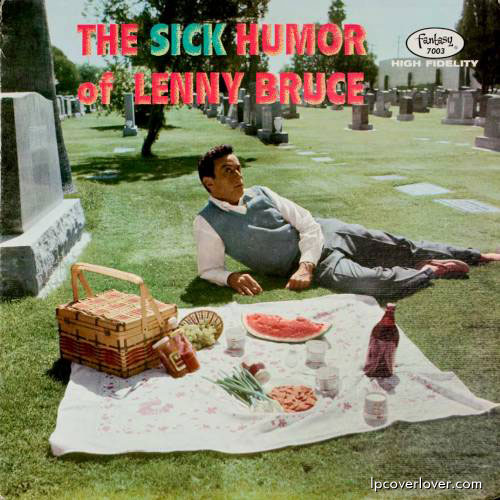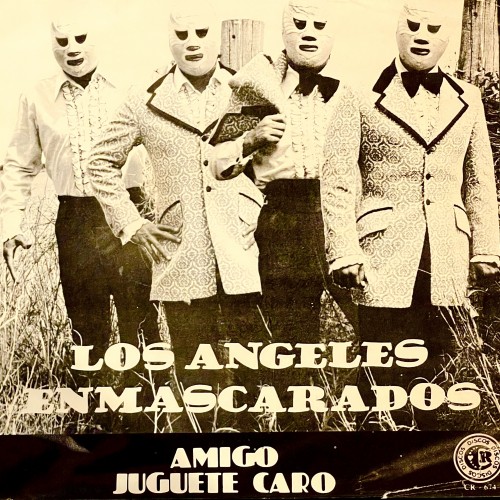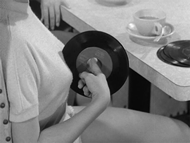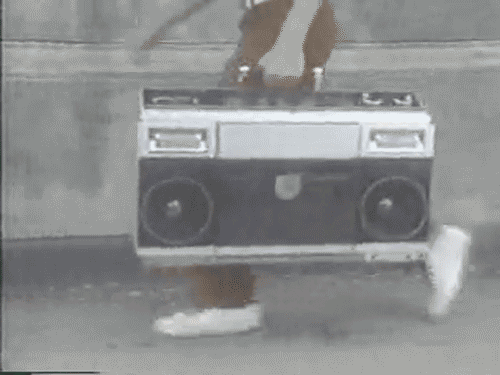Basket case

“The Sick Humor of Lenny Bruce” Fantasy Records (1958) Thanks to Steve Talley for sending this in!
The Liner Notes: We are living in a culture of conformity, the sociologists keep telling us as they pore over statistics that indicate college students are conservative this year. That may be. But sometimes it seems as if the sociologists miss a few points such as Bob and Ray, jazz musicians and the well-honed wit that is bringing the Comedy of Dissent these nights to various clubs in the person of Lenny Bruce.Lenny Bruce is an example of something new in our society. He’s a comic right out of the jazz world. Unlike Mort Sahl, himself a razor wit flavored with a liberal dose of jazz orientation but self-confined to a political and national affairs horizon with forays into a limited social strata bounded on one side by hi-fi and on the other by the psychiatrist’s couch, Lenny Bruce ranges throughout our society. Armed with the anarchistic wit and salty speech of the jazz musician, Bruce does his satirical bits in a multitude of voices as contrasted to Sahl who is a stark, stand-up comic monologist.
Bruce’s whole orientation is that of the jazz musician and knowing this is fundamental to understanding and appreciating Bruce’s humor. Like the jazz musician’s view, Bruce’s comedy isa dissent from a world gone mad. To him nothing is sacred except the ultimate truths of love and beauty and moral goodness – all equating honesty. And like a jazz musician he expects to see these things about him in the world in a pure form. He takes people literally and what they say literally and by the use of his searing imagination and tongue of fire, he contrasts what they say with what they do. And he does this with the sardonic shoulder-shrug of the jazz man.
He is colossally irreverant – like a jazz musician. His stock in trade is to violate the taboos out loud and to say things on stage (and on this LP) which would get your nose bashed in at a party. But his outrage at society is not represented by shrill screams or loud protests. He does not pose. His is a moral outrage and has about it the air of a jazz man. It is strong stuff – like jazz, and it is akin to the point of view of Nelson Algren and Lawerence Ferlinghetti as well as to Charlie Parker and Lester Young.
Bruce improvises the way a jazz musician does. His routines on this album, for instance, are never done the same way twice but move like a soloist improvising on a framework of chords and melody. He takes a hard look at middle-class America with its Babbitts, its Lodges, and its Elmer Gantrys. He stabs the motion picture business with brutal parody and he punctures the hypocrisy in religion, politics, and other areas with an arrowtipped with poison.
Lenny Bruce is a social commentator, as is the jazz musician. It is an interesting point for speculation as to why his comedy of dissent has flourished in the jazz clubs. He terrifies other comics – the usual ones – by his material, in the same way the jazz musician terrifies the hotel bands and the mickey mouse tenor men. He is a threat. If he is real, he gives them the lie by his very existence.
For almost two decades the night clubs have wallowed in a sea of sentimentality and pious corn and bathroom jokes. That’s why Joe E. Lewis is such a relief. He is real and so is Lenny Bruce.
The jazz musician is a rebel with humor, if with a cause, and there is no more effective putdown of the political speeches, the incongruities in the news, the fetuous posing of the tent show religious carnivals than that which goes on in the conversation of the jazz musician and the humor of Lenny Bruce.
It’s ribald. Yes, and even sometimes rough. But it’s real. You have to earn the respect of the jazz musician, he doesn’t give it because he’s told to. And this attitude, a modern manifestation of the original American “show me,” is Bruce’s strength. He’s a verbal Hieronymus Bosh in whose monologue there is the same urgency as in a Charlie Parker chorus and the same sardonic vitality in his comments as in Lester Young’s reflections on a syrupy pop tune.
The jazzman may be anti-verbal, as Kenneth Rexroth says, if so, he has Lenny Bruce to speak for him with power.
– Ralph Gleason




 (22 votes, average: 3.77 out of 5)
(22 votes, average: 3.77 out of 5)






